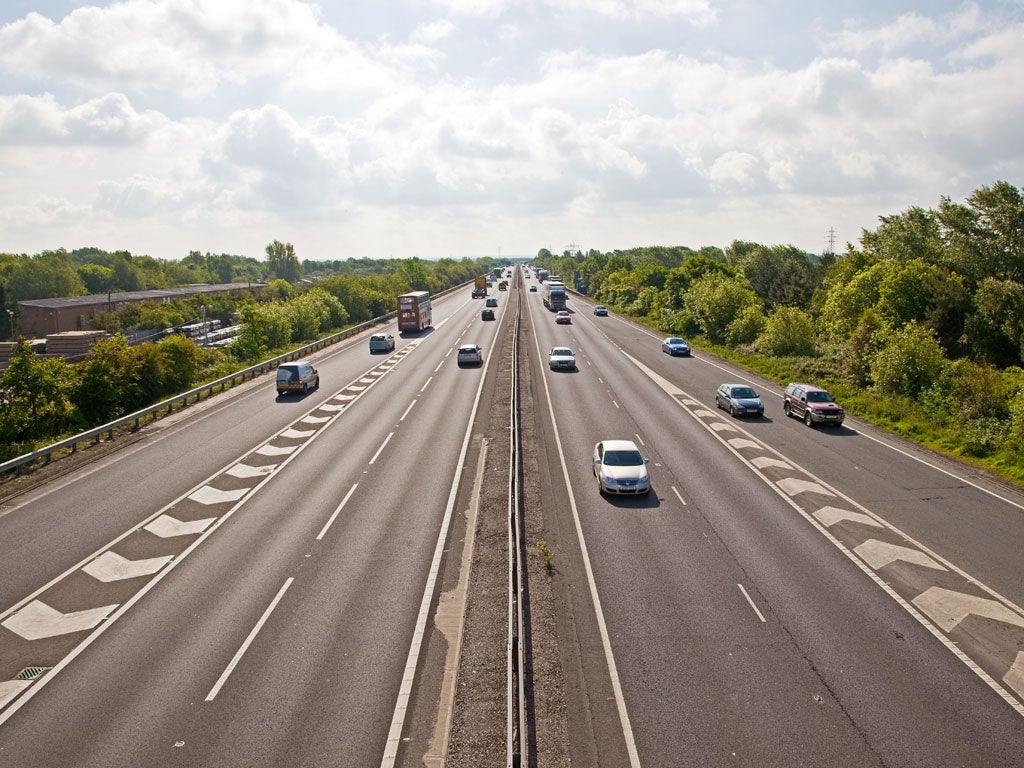Cameron to fill hole in nation's finances by privatising roads
Firms will be paid to maintain network – and tolls could be round the corner

Responsibility for running motorways and main roads will be handed to private companies under plans to be announced today by David Cameron.
The aim is to increase the money available for the country's busiest routes and tackle congestion by putting the private sector in charge of repairing worn-out surfaces and crumbling bridges. But the AA condemned the move as a step towards privatisation and raised fears that it would lead to road tolls.
The plans emerged ahead of Wednesday's Budget, which is expected to give fresh impetus to improvements to the national infrastructure. The Coalition envisages investors bidding for lengthy leases to run motorways and major trunk roads. Although the routes represent only 3 per cent of the national network, they carry a high proportion of the nation's road traffic, including nearly all the freight.
Successful bidders would pay upfront for the lucrative leases and be guaranteed a yearly payment from the Government for maintaining the roads. In return, they would have to demonstrate to an independent regulator that they are maintaining high standards and reducing jams.
They would not be allowed to levy tolls on existing roads, but could charge them on new routes. It was not clear last night whether tolls would be permitted on roads that are substantially improved or widened. The Highways Agency, which is currently in charge of major roads, has an annual budget of £3bn – about half of what the Treasury earns from road tax.
The Government refuses to describe the proposals as a privatisation, arguing that the roads will ultimately remain in state control. The sell-off plans are modelled on the privatisation of water in 1989, which Downing Street said last night was essential for repairing the country's 19th-century sewerage system.
In a speech today, Mr Cameron will warn of an "urgent need to repair the decades-long degradation of our national infrastructure". He will argue that the country needs to "build for the future with as much confidence and ambition as the Victorians once did". He will say that the parts of the road system cannot cope with traffic levels, warning: "Gridlock holds the economy back."
The Prime Minister will argue that the Government is looking at innovative ways of funding improvements to roads. But he will add: "We now need to be more ambitious. Why is it that other infrastructure – for example water – is funded by private-sector capital through privately-owned, independently-regulated utilities ... but roads in Britain call on the public finances for funding?
"We need to look urgently at the options for getting large-scale private investment into the national roads network – from sovereign wealth funds, pension funds, and other investors."
Edmund King, the president of the AA , said he favoured some reform of the Highways Agency but added: "It is a big leap from reform of the Highways Agency to new ownership and financing models for roads. The Government has indicated that tolling may only apply to new capacity, but this could be the thin end of the wedge, leading to full privatisation and road pricing. The road network is crucial to the UK. Drivers have paid for the road network many times over and continue to do so to the tune of £46bn every year."
The Treasury and the Department for Transport will carry out a feasibility study with a view to reporting back to Mr Cameron in the autumn.
A head traffic engineer at a major private transport contractor told The Independent: "The issue is whether the Government is proposing to use the investment to provide new roads as private alternatives, where people pay for the advantage of using less congested routes, such as on the M6 toll road – or forcing people to pay for roads where they have no other viable choices available, which would be massively controversial."
Join our commenting forum
Join thought-provoking conversations, follow other Independent readers and see their replies
Comments
Bookmark popover
Removed from bookmarks